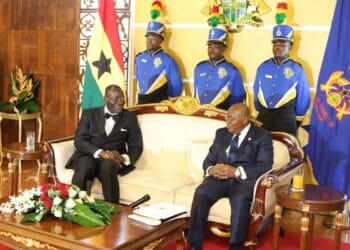The Government of Korea has pledged an additional $28 million to support the second phase of Ghana‘s Science, Technology, Engineering, and Mathematics (STEM) project.
The new funding follows the successful completion of Phase I, which enhanced the teaching and learning of science and mathematics in junior high schools (JHS) across the Eastern and Central regions.
The STEM Phase II project, expected to commence in 2026 and run until 2032, will expand to the Ashanti Region, covering about 800 schools and training 1,600 teachers nationwide. It will also introduce digital learning tools in mathematics and science through the use of tablets and smart classrooms, equipping students with modern, technology-driven learning experiences.
Announcing the commitment at the closing ceremony of Phase I in Accra on Tuesday, Mr Kyongsig Park, Korean Ambassador to Ghana, expressed satisfaction with the progress made and reaffirmed Korea’s commitment to advancing Ghana’s education sector.
“I am pleased to share that the STEM Phase II Project is expected to begin next year and continue until 2032, with a total budget increase from $8.4 million to $28 million,” Mr Park said.
He emphasised that Ghana’s youthful population, with a median age of 21, presented both an opportunity and a challenge. “If you don’t educate your students well, this demographic dividend will change into a demographic curse. If you cannot achieve development now, your younger generation becomes older before they get rich, before your country becomes rich,” he cautioned.
Launched in 2021, the first phase of the project, titled “Enhancing Girls’ Competency in Mathematics and Science through Gender-Responsive Pedagogy in Junior High Schools in Ghana,” aimed to improve outcomes in science and mathematics education, especially for girls, using gender-responsive teaching methods.
Phase I was implemented across 400 JHSs in 10 districts in the Eastern and Central regions, directly benefiting over 49,000 students and training 800 mathematics and science teachers, 400 head teachers, and 68 School Improvement Support Officers (SISOs).
The first phase was executed by the Korea International Cooperation Agency (KOICA) in partnership with the Ministry of Education and the Ghana Education Service (GES) at a total cost of $8.39 million.
Providing details on Phase II, Mr Donghyun Lee, KOICA Country Director, revealed that a major component would be the establishment of a state-of-the-art ASPIRE Centre in the Greater Accra Region, which will serve as a national hub for digital learning, innovation, and teacher training. About 178,000 students are expected to benefit from this second phase.
Follow The Ghanaian Standard channel on WhatsApp for the latest news stories from Ghana.
Mr Haruna Iddrisu, Minister of Education, commended the Korean Government and KOICA for their sustained partnership in promoting STEM education, particularly for girls.
He highlighted the crucial role of science and mathematics in fostering critical thinking, analytical, and problem-solving skills among young learners.
To strengthen STEM education nationwide, the Minister announced several new initiatives, including the establishment of a Science Resource Centre in northern Ghana, a programme to produce locally manufactured STEM equipment for young women, and the introduction of a bill to establish a university in Builsa with support from the Korean Government.

























